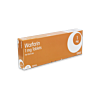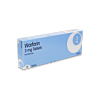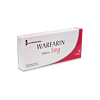Warfarin Sodium
(Warfarin Sodium)-
All Strengths
-
1mg
-
2mg
-
2.5mg
-
3mg
-
4mg
-
5mg
-
6mg
-
7.5mg
-
10mg
What is a generic medication?
Generic medications are significantly discounted copies of brand name medication that have the same active ingredients, intended use, dosage, side effects, effects, and route of administration as the original brand name medication. In other words, generic medications have the same pharmacological effects as their brand-name counterparts. Over half of all prescribed medications are for generic medications.












Warfarin Sodium Drug Information
Are you paying too much for Warfarin Sodium? Save up to 80% when purchasing your prescription drugs from Universal Drugstore. Our prescription service aspires to conveniently provide you with affordable medications at the lowest prices in Canada and internationally.
We’re working with a number of Canadian and international pharmacy partners, all licensed by their qualified governmental regulatory bodies. By collaborating with our partners, we are able to offer a wide range of brand and generic medications at very competitive prices. You can obtain discount prescription drugs through our online pharmacy. Our prices are already up to 80% lower than your local pharmacy. We are committed to providing you with the best service and prices. This is why we’ll match the price of any of our online pharmacy competitors who require a valid prescription.
Order Warfarin Sodium at a discount price today!
Why Buy Warfarin Sodium from Universal Drugstore?
We are the global leader in online prescription drug savings with almost 20 years of experience supplying prescription and over the counter drugs to our international customers. More than 300,000 international patients have used our service to receive their prescription and over-the-counter medications.
In the past two decades together with our international pharmacy partners we have shipped over 2 million prescription medication orders to our satisfied customers.
Your safety is our top priority. You can feel completely secure purchasing through us. We use SSL encryption to secure all of your personal information that is transferred through our website while using our service.
How Long Does It Take to Receive My Warfarin Sodium Order?
You can easily place an order on our website in under 5 minutes. First you need to set up an account with us, create a payment method, and send us your prescriptions. Alternatively, you can order by downloading our order form or by placing an order over the phone. Delivery can take approximately 2 weeks to North America, and 4 weeks to other countries.
Warfarin Sodium Overview
Warfarin Sodium is used to treat blood clots (such as in deep vein thrombosis-DVT or pulmonary embolus-PE) and/or to prevent new clots from forming in your body. Preventing harmful blood clots helps to reduce the risk of a stroke or heart attack. Conditions that increase your risk of developing blood clots include a certain type of irregular heart rhythm (atrial fibrillation), heart valve replacement, recent heart attack, and certain surgeries (such as hip/knee replacement). Warfarin is commonly called a "blood thinner," but the more correct term is "anticoagulant." It helps to keep blood flowing smoothly in your body by decreasing the amount of certain substances (clotting proteins) in your blood.
Warfarin Sodium Warnings
Warfarin can cause very serious (possibly fatal) bleeding. This is more likely to occur when you first start taking Warfarin Sodium or if you take too much warfarin. To decrease your risk for bleeding, your doctor or other health care provider will monitor you closely and check your lab results (INR test) to make sure you are not taking too much warfarin. Keep all medical and laboratory appointments. Tell your doctor right away if you notice any signs of serious bleeding. See also Side Effects section.
How to Use Warfarin Sodium
Read the Medication Guide provided by your pharmacist before you start taking warfarin and each time you get a refill. If you have any questions, ask your doctor or pharmacist. Take Warfarin Sodium by mouth with or without food as directed by your doctor or other health care professional, usually once a day. It is very important to take it exactly as directed. Do not increase the dose, take it more frequently, or stop using it unless directed by your doctor. Dosage of Warfarin Sodium is based on your medical condition, laboratory tests (such as INR), and response to treatment. Your doctor or other health care provider will monitor you closely while you are taking Warfarin Sodium to determine the right dose for you. Use Warfarin Sodium regularly to get the most benefit from it. To help you remember, take it at the same time each day. It is important to eat a balanced, consistent diet while taking warfarin. Some foods can affect how warfarin works in your body and may affect your treatment and dose. Avoid sudden large increases or decreases in your intake of foods high in vitamin K (such as broccoli, cauliflower, cabbage, brussels sprouts, kale, spinach, and other green leafy vegetables, liver, green tea, certain vitamin supplements). If you are trying to lose weight, check with your doctor before you try to go on a diet. Since Warfarin Sodium can be absorbed through the skin and lungs and may harm an unborn baby, women who are pregnant or who may become pregnant should not handle Warfarin Sodium or breathe the dust from the tablets.
Warfarin Sodium Precautions
Before taking warfarin, tell your doctor or pharmacist if you are allergic to it; or if you have any other allergies. Warfarin Sodium may contain inactive ingredients, which can cause allergic reactions or other problems. Talk to your pharmacist for more details. Before using Warfarin Sodium, tell your doctor or pharmacist your medical history,blood disorders (such as anemia, hemophilia), bleeding problems (such as bleeding of the stomach/intestines, bleeding in the brain), blood vessel disorders (such as aneurysms), recent major injury/surgery, kidney disease, liver disease, alcohol use, mental/mood disorders (including memory problems), frequent falls/injuries. It is important that all your doctors and dentists know that you take warfarin. Before having surgery or any medical/dental procedures, tell your doctor or dentist that you are taking Warfarin Sodium and about all the products you use (including prescription drugs, nonprescription drugs, and herbal products). Avoid getting injections into the muscles. If you must have an injection into a muscle (for example, a flu shot), it should be given in the arm. This way, it will be easier to check for bleeding and/or apply pressure bandages. Warfarin Sodium may cause stomach bleeding. Daily use of alcohol while using this medicine will increase your risk for stomach bleeding and may also affect how Warfarin Sodium works. Limit alcoholic beverages. Ask your doctor or pharmacist about how much alcohol you may safely drink. If you have not been eating well, if you have an illness or infection that causes fever, vomiting, or diarrhea for more than 2 days, or if you start using any antibiotic medications, contact your doctor or pharmacist right away because these conditions can affect how warfarin works. Warfarin Sodium can cause heavy bleeding. To lower the chance of getting cut, bruised, or injured, use great caution with sharp objects like safety razors and nail cutters. Use an electric razor when shaving and a soft toothbrush when brushing your teeth. Avoid activities such as contact sports. If you fall or injure yourself, especially if you hit your head, call your doctor right away. Your doctor may need to check you. The FDA has stated that generic warfarin products are interchangeable. However, consult your doctor or pharmacist before switching warfarin products. Be careful not to take more than one medication that contains warfarin unless specifically directed by the doctor or health care provider who is monitoring your warfarin treatment. Older adults may be at greater risk for bleeding while using Warfarin Sodium. Warfarin Sodium is not recommended for use during pregnancy because of serious (possibly fatal) harm to an unborn baby. Discuss with your doctor the use of reliable forms of birth control while taking Warfarin Sodium and for 1 month after stopping the medication. If you become pregnant or think you may be pregnant, tell your doctor right away. If you are planning pregnancy, discuss a plan for managing your condition with your doctor before you become pregnant. Your doctor may switch the type of medication you use during pregnancy. Since Warfarin Sodium can be absorbed through the skin and lungs and may harm an unborn baby, women who are pregnant or who may become pregnant should not handle Warfarin Sodium or breathe the dust from the tablets. Very small amounts of Warfarin Sodium may pass into breast milk but is unlikely to harm a nursing infant. Consult your doctor before breast-feeding.
Warfarin Sodium Misdose
For the best possible benefit, do not miss any doses. If you do miss a dose and remember on the same day, take it as soon as you remember. If you remember on the next day, skip the missed dose. Take your next dose at the regular time. Do not double the dose to catch up because this could increase your risk for bleeding. Keep a record of missed doses to give to your doctor or pharmacist. Contact your doctor or pharmacist if you miss 2 or more doses in a row.
Warfarin Sodium Interactions
See also How to Use section. Drug interactions may change how your medications work or increase your risk for serious side effects. This document does not contain all possible drug interactions. Keep a list of all the products you use (including prescription/nonprescription drugs and herbal products) and share it with your doctor and pharmacist. Do not start, stop, or change the dosage of any medicines without your doctor's approval. Warfarin interacts with many prescription, nonprescription, vitamin, and herbal products. This includes medications that are applied to the skin or inside the vagina or rectum. The following interactions listed do not contain all possible drug interactions. The interactions with warfarin usually result in an increase or decrease in the "blood-thinning" (anticoagulant) effect. Your doctor or other health care professional should closely monitor you to prevent serious bleeding or clotting problems. While you are taking warfarin, it is very important to tell your doctor or pharmacist of any changes in medications, vitamins, or herbal products that you are taking.imatinib, marijuana (cannabis), dronabinol, mifepristone. Aspirin, aspirin-like drugs (salicylates), and nonsteroidal anti-inflammatory drugs (NSAIDs such as ibuprofen, naproxen, celecoxib) may have effects similar to warfarin. These drugs may increase the risk of bleeding problems if taken during treatment with warfarin. Carefully check all prescription/nonprescription product labels (including drugs applied to the skin such as pain-relieving creams) since the products may contain NSAIDs or salicylates. Talk to your doctor about using a different medication (such as acetaminophen) to treat pain/fever. Low-dose aspirin and related drugs (such as clopidogrel, ticlopidine) should be continued if prescribed by your doctor for specific medical reasons such as heart attack or stroke prevention. Consult your doctor or pharmacist for more details. Warfarin Sodium may interfere with a certain laboratory test to measure theophylline levels, possibly causing false test results. Make sure laboratory personnel and all your doctors know you use Warfarin Sodium.
Warfarin Sodium Side Effects
Nausea, loss of appetite, or stomach/abdominal pain may occur. If any of these effects last or get worse, tell your doctor or pharmacist promptly. Remember that Warfarin Sodium has been prescribed because your doctor has judged that the benefit to you is greater than the risk of side effects. Many people using Warfarin Sodium do not have serious side effects. Warfarin Sodium can cause serious bleeding if it affects your blood clotting proteins too much (shown by unusually high INR lab results). Even if your doctor stops your medication, this risk of bleeding can continue for up to a week. Tell your doctor right away if you have any signs of serious bleeding,nosebleeds that happen often or don't stop, unusual pain/swelling/discomfort, unusual/easy bruising, prolonged bleeding from cuts or gums, unusually heavy/prolonged menstrual flow, pink/dark urine, coughing up blood, vomit that is bloody or looks like coffee grounds, severe headache, dizziness/fainting, unusual tiredness/weakness, bloody/black/tarry stools, chest pain, shortness of breath, difficulty swallowing. Tell your doctor right away if you have any serious side effects,nausea/vomiting that doesn't stop, severe stomach/abdominal pain, yellowing eyes/skin. Warfarin Sodium rarely has caused very serious (possibly fatal) problems if its effects lead to small blood clots (usually at the beginning of treatment). This can lead to severe skin/tissue damage that may require surgery or amputation if left untreated. Patients with certain blood conditions (protein C or S deficiency) may be at greater risk.painful/red/purplish patches on the skin (such as on the toe, breast, abdomen), signs of kidney problems (such as change in the amount of urine), vision changes, confusion, trouble speaking, weakness on one side of the body. A very serious allergic reaction to Warfarin Sodium is rare. However, get medical help right away if you notice any symptoms of a serious allergic reaction,rash, itching/swelling (especially of the face/tongue/throat), severe dizziness, trouble breathing. This is not a complete list of possible side effects. If you notice other effects not listed above, contact your doctor or pharmacist. Call your doctor for medical advice about side effects. You may report side effects to FDA at 1-800-FDA-1088 or at www.fda.gov/medwatch. In Canada - Call your doctor for medical advice about side effects. You may report side effects to Health Canada at 1-866-234-2345.
Warfarin Sodium Storage
Store at room temperature away from light and moisture. Do not store in the bathroom. Keep all medications away from children and pets. Do not flush medications down the toilet or pour them into a drain unless instructed to do so. Properly discard Warfarin Sodium when it is expired or no longer needed. Consult your pharmacist or local waste disposal company for more details about how to safely discard your product.
IMPORTANT DISCLAIMER: All medical content is supplied by a third-party company who is independent from this web site. As such, this web site cannot guarantee the reliability, accuracy, and /or medical efficacy of the information provided. In all circumstances, you should seek the advice of a health professional pertaining to drug, treatment and/or medical condition advice. Note that not all products are shipped by our contracted Canadian pharmacy. This website contracts with dispensaries around the world that ship products directly to our customers. Some of the jurisdiction include but are not limited to United Kingdom, Europe, Turkey, India, Canada, Vanuatu, Mauritius, and USA. The items within your order may be shipped from any one of these jurisdictions depending on the availability and cost of the products at the time you place your order. The products are sourced from these countries as well as others. Please note that the product appearance may vary from actual product received depending on availability.


